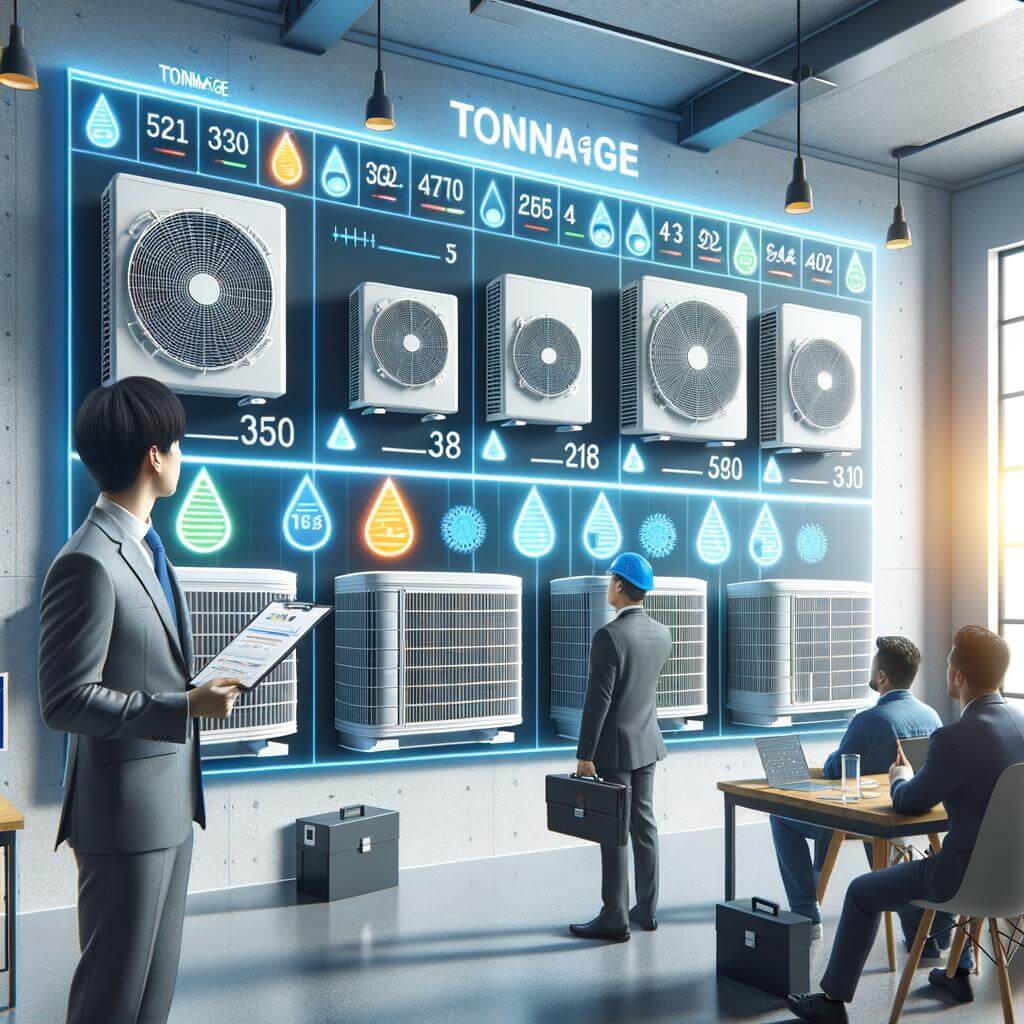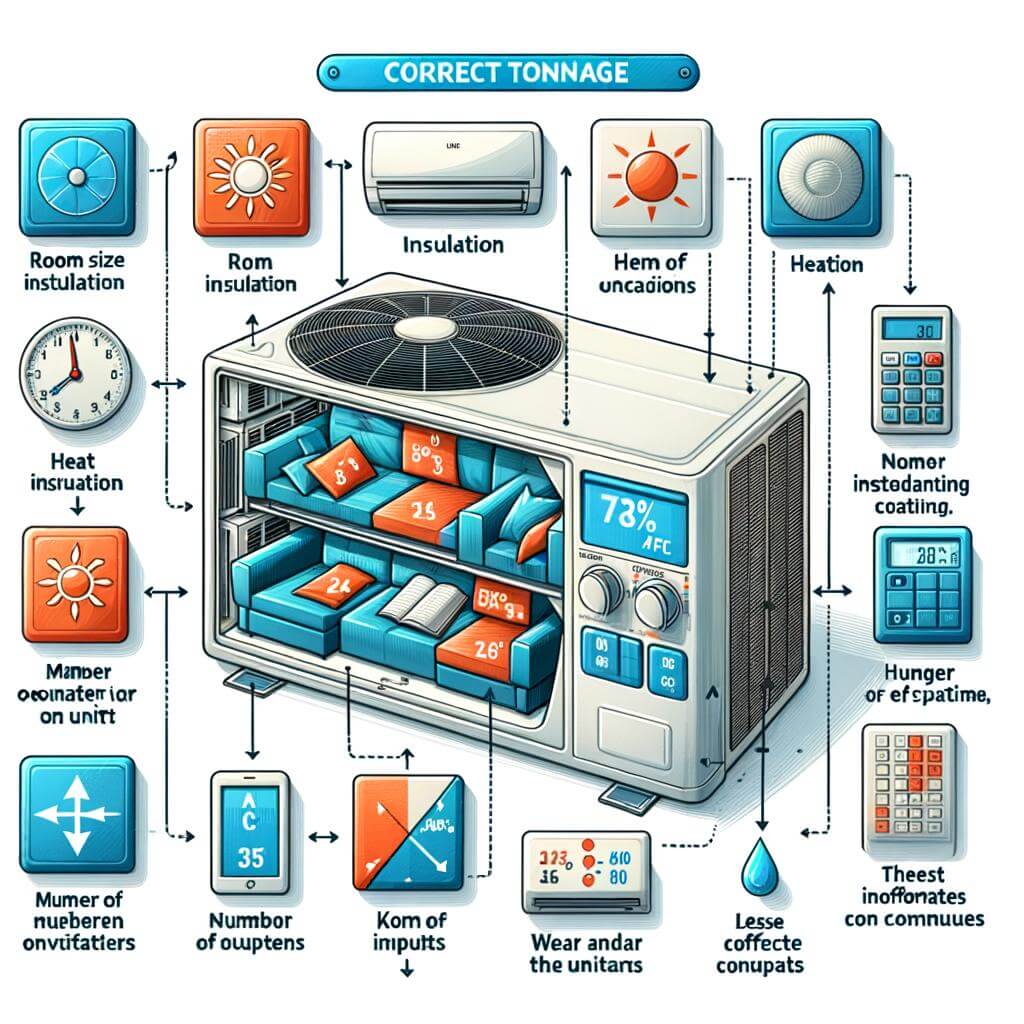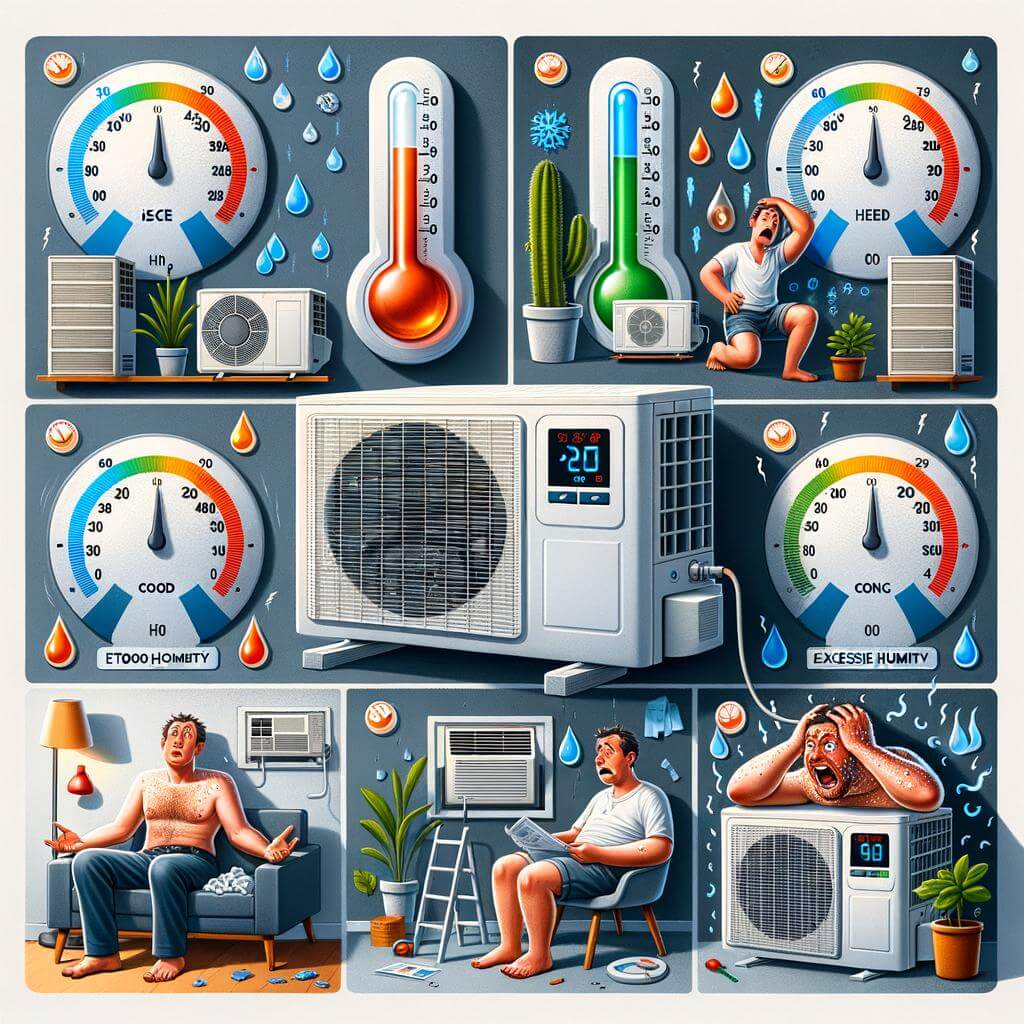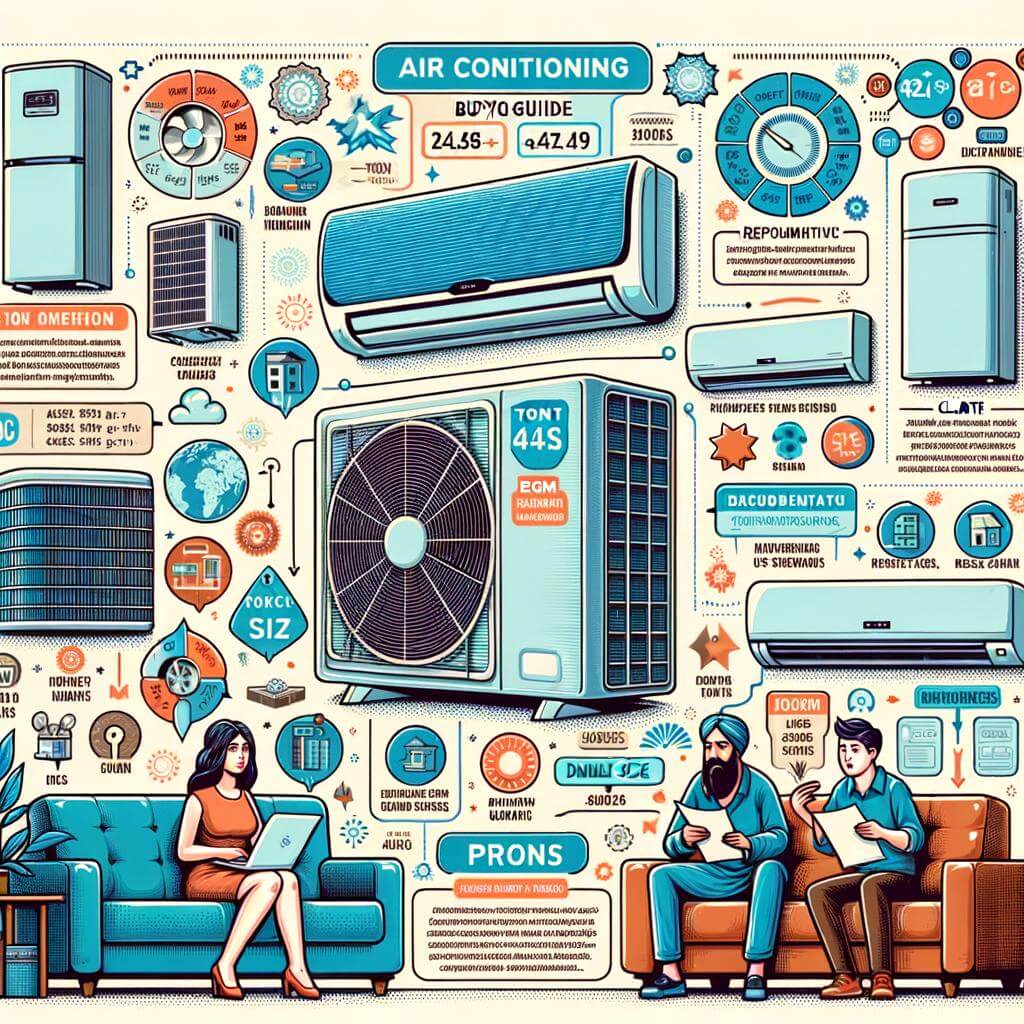Welcome to our informational post titled “Understanding Tonnage in Air Conditioning Systems at Home”. This comprehensive guide is designed to help homeowners gain a clearer understanding of what tonnage in an AC system means and how it affects their home’s cooling efficiency and energy consumption. Navigating the world of HVAC systems can be complex, but our expert insights will simplify the concept of tonnage, allowing you to make more informed decisions about your home’s cooling system. So whether you’re looking to install a new system or just want to learn about your current one, this post will prove extremely useful. With facts and expert opinions, we strive to make this often convoluted topic easy to comprehend and practical to use.
Understanding the Concept of Tonnage in Air Conditioning Systems
When we talk about air conditioning systems, the term “tonnage” often comes up. This term, unfamiliar to many, is crucial in the HVAC world. Tonnage, in the simplest of terms, refers to the cooling capacity of an air conditioner. It’s derived from the amount of heat required to melt one ton of ice in a 24-hour period. With this understanding, let’s go deeper to comprehend how tonnage impacts the efficiency and effectiveness of your air conditioning system at home.
The Importance of Correct Tonnage
The right tonnage in an air conditioner ensures your system runs efficiently. An oversized system will cool the room quickly, failing to properly dehumidify the air, leaving your home feeling clammy. Conversely, an undersized system will constantly run, trying to attain the desired temperature, consuming more energy and wearing out sooner. Hence, it’s critical to have a system perfectly sized for your place. Some factors that determine the correct tonnage include:
- House Size: Larger homes will require larger capacity units.
- Climate: Warmer climates will need more cooling capacity compared to colder regions.
- Insulation: Well-insulated homes can do with lesser capacity units.
Here is a simple guide on how tonnage typically corresponds to square footage:
| Home Size (in sq. ft) | AC Size (in tons) |
|---|---|
| Up to 1500 | 1.5 to 2 |
| 1500 – 2500 | 2 to 3 |
| 2500 – 3500 | 3 to 4 |
| Above 3500 | 4 and above |
Thus, by understanding the concept of tonnage, you can select the right air conditioning system for your home and make the most efficient energy use.
The Importance and Implications of Correct Tonnage in Air Conditioning
One key factor that is often overlooked when installing or replacing an air conditioning system is the aspect of correct tonnage. Air conditioning tonnage is a measure that denotes the cooling capacity of an air conditioning system. It’s crucial to select the appropriate tonnage for your home for a number of reasons.
The right tonnage ensures energy efficiency. A system that is too large uses excess energy and may not distribute cool air evenly, resulting in energy waste. On the contrary, a smaller system will run continuously, struggling to maintain the desired indoor temperature, leading to a surge in electricity bills. Thus, selecting the correct tonnage can result in significant energy and monetary savings.
- Improved longevity: Appropriate tonnage also affects the lifespan of your air conditioning system. Overworked or underworked systems wear out faster, needing frequent repairs or replacements.
- Avoids humidity issues: An oversized air conditioner might rapidly cool your space but will fail to effectively remove humidity, leading to a clammy and uncomfortable indoor climate.
In addition to these basic implications, proper air conditioner tonnage is crucial for maintaining a comfortable indoor environment. It’s easy to assume that a larger air conditioner will cool your home faster. However, matching the size of your air conditioner to the size of your space will deliver the most efficient performance.
In conclusion, understanding the correct tonnage is an essential part of selecting an air conditioning system. Taking into account your home’s size, insulation status, and local climate can help you choose the best fit for your needs. Remember, a professionally sized and installed system not only provides optimum comfort but also ensures energy efficiency and longevity of service.
Variables that Influence the Tonnage of Air Conditioning Systems at Home
The tonnage of an air conditioning unit refers to its cooling capacity. The larger a home or space, the higher the required tonnage of an air conditioning unit to effectively cool it. Various factors can influence this requirement, creating the need for a comprehensive understanding of these variables to make an informed decision.
The size of your home is a primary determinant of air conditioning tonnage. Homes with larger square footage generally need larger AC units. The climate where you live also plays a role. Homes in hotter climates typically require a higher tonnage as the unit needs to work harder to cool the indoor air. The amount of sunlight your home receives can affect this too, as more sunlight means more heat, requiring an AC unit with higher cooling capacity.
- Insulation: Homes with poor insulation allow more heat to penetrate, thus needing a higher tonnage AC system.
- Occupancy: More people in the home generate more heat, increasing the need for a higher capacity unit.
- Appliances: Appliances such as stoves, ovens, TVs, and computers can also significantly contribute to a home’s heat level.
| Home Size (sq. ft.) | Approximate AC Tonnage |
| Up to 1,200 | 2.5 – 3 tons |
| 1,200 to 1,600 | 3 – 4 tons |
| 1600 -2,200 | 5 tons |
Knowing these factors ensure you select the optimal air conditioning system tonnage for your home. Take note that oversizing can lead to excess humidity, while undersizing may require the unit to run constantly, leading to higher energy consumption. It’s best to involve a professional heating, ventilation, and air conditioning (HVAC) technician to accurately assess your home’s specific cooling needs.
How to Calculate the Correct Tonnage for Your Home’s Air Conditioning
Tonnage is a term used to indicate the cooling capacity of an air conditioner. It’s essential that you understand how this works to ensure that you are picking a unit that has the correct tonnage for your home.
To effectively calculate the correct tonnage, you must account for a number of variables. Factors such as the size of your home, its location, the local climate, and even the number of windows can all affect this calculation.
The first step to calculate the tonnage is to find out the square footage of the area you want to cool. This is typically calculated by length times width of each room and then adding these figures together.
Consider the climate in your location. If you live in a hotter climate, you may need a cooling unit with a bigger capacity. Conversely, if you live in a cooler climate, a unit with a lower tonnage may suffice.
Additional considerations include factors such the number of people who live in the house and the amount of heat-producing appliances. More people and appliances can mean the need for more cooling capacity.
Remember, these figures are merely suggestions—not definitive measurements. We highly recommend consulting with a HVAC professional to calculate the correct tonnage for your home’s air conditioning system to ensure maximum efficiency and comfort.
Problems Arising from Incorrect Tonnage in Air Conditioning Units
Choosing the right size for your air conditioning unit is essential to ensure both ideal comfort levels and energy efficiency. Although many people assume that bigger is always better when it comes to AC units, this is not the case. An oversized unit will quickly cool your home but then shut off, failing to remove humidity efficiently. This leads to a clammier, less comfortable environment. Conversely, an undersized unit will struggle to manage the cooling task, resulting in less effective cooling and increased wear on the system.
Understanding the term ‘tonnage’ can remedy these issues. The tonnage of an AC unit indicates its ability to cool a specific amount of space. For example, a 1-ton unit can cool 12,000 British thermal units (BTUs) in an hour. Therefore, matching the size of your home to the right tonnage is vital. Below are some problems homeowners may face if they choose the wrong tonnage:
- Increased energy bills: Both undersized and oversized units work harder and consume more energy, leading to inflated utility bills.
- Shortened unit lifespan: Incorrect sizing puts additional strain on the AC, causing the unit to wear out sooner.
- Uncomfortable home environment: As mentioned earlier, the wrong sized unit fails to manage the cooling requirements efficiently, resulting in an uncomfortable climate.
While calculating the correct tonnage requires an understanding of several factors such as local climate, insulation level, window sizes, and direction your house faces, here’s a simple table illustrating the typical tonnage per sq feet of your home:
To ensure optimal results, always consult with an HVAC professional who can provide a detailed analysis and guide you in selecting the right tonnage for your specific home needs.
Choosing the Right AC: Expert Recommendations on Tonnage Selection
In the world of air conditioning, understanding tonnage is key to ensuring that you select an AC unit that can efficiently and effectively cool your space. Tonnage refers to the cooling capacity of an AC system, with one ton equivalent to the amount of heat required to melt one ton of ice over a 24-hour period. Contrary to popular belief, a bigger AC unit does not always equate to better cooling. An oversized AC system can lead to inefficient energy usage, frequent on-off cycling, and an uncomfortable, clammy indoor environment.
Choosing ideal tonnage for your air conditioning system necessitates taking into account a myriad of factors. These include your home’s square footage, ceiling height, insulation quality, and sunlight exposure, among others. Here is a simple guide that may aid in approximating the right tonnage:
While this table can offer a general road map, it’s crucial to remember that every home is unique. Engaging a professional HVAC contractor for a comprehensive evaluation is the best way to ensure appropriate tonnage selection. This is because a detailed load calculation factors in more nuanced considerations, such as the number of windows and doors, the orientation of the home, and the type and number of appliances. Invest time and effort in getting the tonnage right – your comfort, energy bills, and the longevity of your AC system may depend on it.
Concluding Remarks
In conclusion, understanding tonnage in your home’s air conditioning system is a crucial aspect when considering energy efficiency, the comfort of your living space, and long-term cost-effectivity. Ensuring you have the correct AC size for your home is not just about staying cool; it’s about optimizing performance while respecting your budget. Educating yourself about AC tonnage will empower you to make the best choice for your home. Hopefully, this article has shed light on this important topic and provided you with valuable insights. So, the next time you’re discussing air conditioning options, you’ll be better equipped to make an informed decision. Explore more about sustainable living and home comfort strategies through our other homeowner tips and expert advice. Your comfort is our priority!









